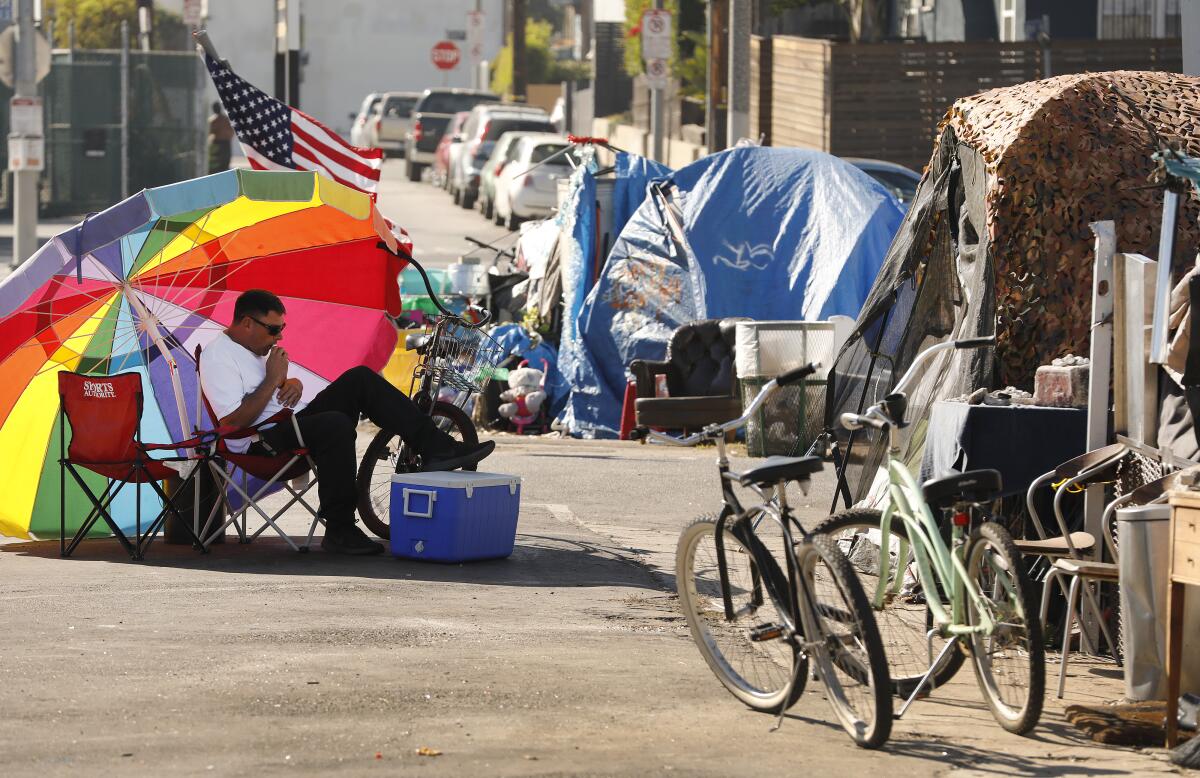Editorial: Telling homeless people where they cannot camp will not stop them from being homeless

As the Los Angeles City Council debated Tuesday how to handle homeless encampments, Council member Paul Krekorian offered a scenario he wanted to avoid: a police officer approaching a homeless disabled veteran on a sidewalk and saying, “You need to go into a shelter tonight. I know it’s midnight. But you need to pick up and go to a shelter, or you’re going to jail.” Krekorian asked his colleagues: “Is that the city we want?”
Shortly after, the council voted 12 to 3 in favor of a proposal from Krekorian and five other members instructing the city administrative officer to come up with a strategy to deploy a massive citywide street outreach effort to offer homeless individuals shelter or housing before prohibiting sitting, sleeping and lying in different areas of the city. But it also asked the city attorney to come up with a new anti-camping ordinance.
“Before unhoused people are restricted from occupying a public space, they should be thoughtfully engaged and offered suitable alternatives ... and that should be our mantra, that should be our North Star,” said Council member Mark Ridley-Thomas, who helped craft the motion that passed.
Unfortunately, all the council has at the moment is the ordinance that the city attorney drafted for the council to consider, and it is far removed from that North Star. The proposal starkly lays out a list of spaces where homeless people will be prohibited from camping. So far, there’s no balance between compassion and compliance that the council members themselves vowed to seek.
Some parts of the proposal are commonsense restrictions — no camping in or near a driveway, entrance or exit lane of traffic or next to a fire hydrant. Technically, those restrictions should have been enforced even during the pandemic when homeless camps were left in place to lessen the chances of homeless people getting infected with and spreading COVID-19.
The ordinance would also prohibit tents from blocking sidewalks (a law that was in place but not enforced during the pandemic) and set rules against camping within 500 feet of a school, day-care center, public park or library. Also prohibited would be camping within 1,000 feet of any relatively new housing development or shelter for homeless people. There’s also a proposed restriction on camping in an underpass or near it.
And it would allow the City Council to designate various places around the city off-limits to homeless people if there has been a public health or safety issue with encampments in those areas. That’s alarmingly vague.
Councilman Mike Bonin said he agreed with some of the restrictions but added (before voting against it): “We do a lot to define where people cannot be. We don’t do much … to define where people can be.”
There’s no question that homeless encampments across Los Angeles are an unacceptable way for people to live, and their presence has frayed the nerves of residents and businesses. But at its root, homelessness is about poverty — even in cases when homeless individuals experience mental illness or suffer from substance abuse.
The question is, as always, how to get people the housing and services they need. That doesn’t mean the city has to solve the root causes of homelessness before any person is moved off a street. But it does mean that simply putting up a lot of signs prohibiting camping will not make encampments vanish from the sidewalks. In fact, it never has. Citing and arresting homeless people for being on the street has yet to solve homelessness.
So if council members are serious about coupling the anti-camping rules with street engagement — and most have said they are — then they should formally approve an extensive outreach program to go along with this ordinance. They should put it in place and make the new ordinance enforceable only after offers of temporary or permanent housing have been made. That sort of effort is being undertaken right now at Venice Beach.
Nor should council members be allowed to pick their own outreach workers. Rely on the guidance of professionals, such as the L.A. Homeless Services Authority. We know there are council members grumbling about the agency. Now is the time for the council and the agency to work out their differences and commit to getting people housed.
We also know there isn’t enough housing right now — either permanent or temporary. The more the city wants people out of encampments, the more creative it must become in finding places where homeless people can live, at least temporarily, in privacy and safety. In addition to motel and hotel rooms, that probably means more villages of tiny homes and more safe camping grounds with security, food, water, restrooms and showers — and service providers.
If the council wants a humane approach, this is what it looks like. Compassion takes work. But the alternative — shooing homeless people away from streets, citing them or arresting them — does not work.
More to Read
A cure for the common opinion
Get thought-provoking perspectives with our weekly newsletter.
You may occasionally receive promotional content from the Los Angeles Times.










